December 2016
Great Book on Spectrum Policy
18 12, 16 12:06 Filed in: spectrum management
There aren't many serious books on spectrum policy for either class instruction or for a reference for professionals. Haim Mazar, formerly of the Israeli national spectrum regulator and a veteran of ITU deliberations has done a great service by writing such a book. Before the book came out, I heard positive comments about him from both an FCC staffer who frequently participated in ITU activities and his counterpart from a nearby Arab country who had dealt with him on regional spectrum issues.
While it has a good section on many of the technical aspects of spectrum policy (Chapter 5 - RF Engineering and Link Budget), the non engineer can set that aside for review as needed. However, the wireless engineering program that wants to use this for a textbook will find that the chapter adds a key part of technical anises that is not normally addressed in electrical engineering education. Many such engineering programs take spectrum policies as coming direct from Mt. Sinai and being immutable. Rather this section shows how technical rules are developed from physical phenomena and estimates of reasonable radio equipment performance which inevitably varies with both equipment cost and progress in technology. A whole chapter is devoted to ITU issues and the parallel recent role of standards development organizations/SDOs. There is a good discussion of the goals of national spectrum management followed by more detail on regulatory arrangements in China, France, UK, and US.
A final chapter on RF safety is more technical than the rest of the book but is a convenient reference to have around when the topic comes up.
While there is discussion of radio propagation in Chapter 5, the focus is on traditional bands and nothing is said about the current "spectrum frontier" of millimeter waves and how the propagation there is so different than the lower traditional bands. But, then again, most spectrum management controversies involved these lower bands. and they will be the interest of most readers. But with that limitation it does an excellent job covering many different aspects of this interdisciplinary field.
While it has a good section on many of the technical aspects of spectrum policy (Chapter 5 - RF Engineering and Link Budget), the non engineer can set that aside for review as needed. However, the wireless engineering program that wants to use this for a textbook will find that the chapter adds a key part of technical anises that is not normally addressed in electrical engineering education. Many such engineering programs take spectrum policies as coming direct from Mt. Sinai and being immutable. Rather this section shows how technical rules are developed from physical phenomena and estimates of reasonable radio equipment performance which inevitably varies with both equipment cost and progress in technology. A whole chapter is devoted to ITU issues and the parallel recent role of standards development organizations/SDOs. There is a good discussion of the goals of national spectrum management followed by more detail on regulatory arrangements in China, France, UK, and US.
A final chapter on RF safety is more technical than the rest of the book but is a convenient reference to have around when the topic comes up.
While there is discussion of radio propagation in Chapter 5, the focus is on traditional bands and nothing is said about the current "spectrum frontier" of millimeter waves and how the propagation there is so different than the lower traditional bands. But, then again, most spectrum management controversies involved these lower bands. and they will be the interest of most readers. But with that limitation it does an excellent job covering many different aspects of this interdisciplinary field.
Comments
Observations on FCC Staffing from the Plum Book
17 12, 16 09:38 Filed in: FCC personnel policy | FCC Reform
A ritual in DC every 4 years is publication of the "Plum Book" - which GPO produces with a plum colored cover showing they have a good sense of humor.
This book lists all the political jobs in the federal government and all the senior jobs that could be occupied by political appointees. While FCC staffing info is theoretically public information with respect to position title,job holder's name and salary, in reality this information is not readily available. But in the Plum Book we get a readily available snapshot that is illuminating. As a public service here is a link to the 3 pages that deal with FCC. From the FCC listings we can see how many senior positions there are at FCC, which are held by political appointees and which are held by career appointees.
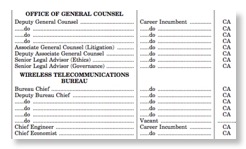
But then consider the following tweet from Chairman's Office official Gigi Sohn:
Applause for @mattdelnero as he leaves @fcc after a terrific tenure as Wireline Bureau Chief. pic.twitter.com/9pkwcNHsbX
— Gigi Sohn (@GigiBSohnFCC) December 15, 2016
A little further down in the Plum Book we see that Mr. DelNero is a "career incumbent" who is leaving FCC a little less than 3 years after joining it from Covington & Burling. What is going on?

While there are some that may be critical of everything the current FCC leadership has done, this involves a practice that has been going on for decades at FCC under BOTH parties.
The commissioners, their advisors, the senior managers in the Office of Media relations, and the chief of the Public Safety and Homeland Security Bureau are now political appointees and usually have been so in the past. The position of general counsel has nominally alternated back and forth between career and political over the years. My old boss at OET, Ed Thomas, chose to be chief of that office as a political appointee although he certainly was qualified for a career appointment due to his management and technical experience. Ed thought it would give him more prestige in dealing with political appointees at other agencies.
But most of the other bureau/office chiefs and some of their deputies are de facto political appointees who have been masquerading as career appointees and will leave in droves in the next few weeks. This masquerading has several "advantages" to the individuals involved:
- It gets around limits on the number of political appointees at FCC and allows the Chairman to stack senior managers with people who have unambiguous loyalty to him
- Career senior officials have to be vetted by OPM and committees of actual career civil servants for both job related skills and management experience. Some younger lawyers from private practice may not qualify under such standards
- Only career senior officials are eligible for special SES "performance awards"/bonuses of 5-20% of their normal salary, so having a career appointment has financial benefits
But this decades old bipartisan procedure has real downsides also.
- It discourages the development of an effective tier of top career civil servants who are politically neutral and act in the interests of the agency with loyalty to the current leadership. You say this is impossible? Consider Bob Pepper the chief of the former Office of Plans and Policy who held senior policy jobs and was a trusted advisor to chairman of both parties. OET Chief Julius Knapp has only served in that position under the current administration but has been widely viewed as politically neural during his long tenure as deputy in OET. It is hard to have such a career path at FCC now and as a result sometimes career civil servants are not as objective as they should be. Some may tell political people what they want to hear and some may secretly drag their feet on policies they disagree with. Both are inappropriate behavior for career civil servants and the fear of this is why political appointees want a thorough house cleaning.
- This system keeps much of the SES bonus pools away from real career civil servants where Congress directed it to go, further discouraging them.
- It results in large flux of senior managers with FCC chairman transitions. This is not just when the party in the White House changes. I recall a massive "career incumbent" shakeup when Chmn. Fowler left and was replace by Chmn. Sikes near the end of the Reagan Administration. This large group of senior changes decreases FCC productivity and effectiveness.
When my wife worked at NRC she reported no influx of political appointees masquerading as career civil servants into senior manage positions. NRC has a career civil service management structure that is loyal to the institution. More of this at FCC would probably help FCC effectiveness and allow the new leadership to have on hand a loyal and effective team to advise them and implement the desired policies.
Such a change cannot be implemented immediately because the current career civil servants have been affected by past practices, but I hope the next Commission will recognize the the large level of politicization of senior managers at FCC is really counterproductive. Once this problem is recognized it can start considering options for a slow and deliberate change in senior staffing and building up the skills of career civil servants to make FCC more effective.
Older Plum Books for comparison
2008
2012
UPDATE
Is it obvious to others why the bureau chief who deals with public safety should be a political appointee? It has been since this bureau was created so both parties have been behaving the same way. But does it really make sense?
.@FCC Public Safety Bureau Chief David Simpson says he will leave agency Jan. 20, same day as @TomWheelerFCC
— Howard Buskirk (@hbuskirk) December 21, 2016
Lessons on FCC Morale
16 12, 16 09:02 Filed in: FCC personnel policy | FCC Reform

This week the Best Places to Work in the Federal Government report was issued as it has been every year since the Bush 43 administration fostered the start of this program in 2003 and made surveys mandatory for Executive Branch agencies. FCC participation was optional and it dodged the survey until the 2009 survey - based on 2008 data collection during the Martin chairmanship. Now the purpose of FCC is not to amuse its staff and keep them happy. But enlightened management knows that you can get more done if everyone on the team understands goals and works in the same direction. Indeed, if they don't why have 1500-2000 people sitting around.
During my career at FCC Chmn. Michael Powell seemed to be the best leader at motivating the staff. Chmn. Kevin Martin, his immediate successor, the worst. Both Republicans. Most FCC chairs in recent history had essentially no management experience. They were generally Hill staffers or lawyers in private practice. Chmn. Wheeler despite other flaws, had at least directed 2 trade associations with a few hundred employees. Chmn. Powell did not have this direct experience, but he grew up in the family of a senior military officer and no doubt learned from his father how to be a leader of those in your unit. He also had been a junior military officer before his career was wrecked by a near fatal training accident. Having been a junior officer myself, I know that leadership training is a key part of preparation for commissioning. I doubt if many other FCC chairs have had comparable training.
So let's look at this year's results:

FCC had a dismal score during the Martin chairmanship as morale plummeted. This was particularly striking after the enlightened workplace leadership of Chmn. Powell. While Chmn. Genachowski was controversial for some of his policies, he at least made a wonderful turnaround in workplace morale at FCC.
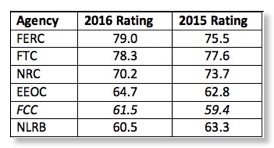
So I hope that the Transition Team in planning the new FCC leadership focuses on the positive accomplishments of Chmn. Powell in FCC administration and leadership and eschews the management style of Chmn. Martin, his successor. This is an independent issue of the 8th Floor harmony illustrated at left. Now partisanship in FCC is not totally independent of partisanship on the Hill so blaming Chmn. Wheeler entirely for this partisanship growth in FCC voting is not really fair. FCC is not really isolated from Congress especially when 3 of the commissioners are former Hill staffers and a fourth is the daughter of a key House member. Hill staffers make great commissioners, but there is a downside of having a near monoculture of such former staffers on the Commission.
So let's hope in the next few years we can have both good staff morale at FCC and better 8th Floor harmony too.
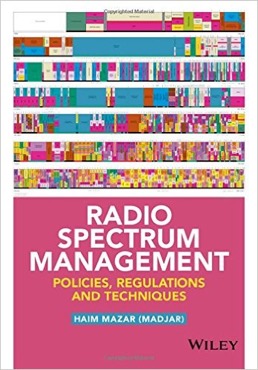
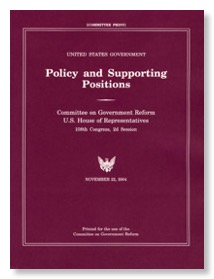
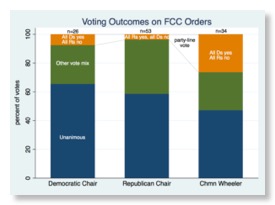



![Validate my RSS feed [Valid RSS]](valid-rss-rogers.png)

